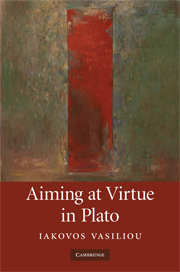22 results
CONTRIBUTORS
-
-
- Book:
- Plato and the Divided Self
- Published online:
- 05 March 2012
- Print publication:
- 16 February 2012, pp vii-x
-
- Chapter
- Export citation
1 - From the Phaedo to the Republic
- from Part I - Transitions to tripartition
-
-
- Book:
- Plato and the Divided Self
- Published online:
- 05 March 2012
- Print publication:
- 16 February 2012, pp 9-32
-
- Chapter
- Export citation
Chapter 7 - Aristotle, agents, and actions
-
-
- Book:
- Aristotle's <I>Nicomachean Ethics</I>
- Published online:
- 07 September 2011
- Print publication:
- 18 August 2011, pp 170-190
-
- Chapter
- Export citation
Acknowledgements
-
- Book:
- Aiming at Virtue in Plato
- Published online:
- 22 September 2009
- Print publication:
- 06 November 2008, pp ix-x
-
- Chapter
- Export citation
Introduction
-
- Book:
- Aiming at Virtue in Plato
- Published online:
- 22 September 2009
- Print publication:
- 06 November 2008, pp 1-21
-
- Chapter
- Export citation
Bibliography
-
- Book:
- Aiming at Virtue in Plato
- Published online:
- 22 September 2009
- Print publication:
- 06 November 2008, pp 286-294
-
- Chapter
- Export citation
Contents
-
- Book:
- Aiming at Virtue in Plato
- Published online:
- 22 September 2009
- Print publication:
- 06 November 2008, pp vii-viii
-
- Chapter
- Export citation
Chapter 5 - Socrates and Thrasymachus: Republic 1
-
- Book:
- Aiming at Virtue in Plato
- Published online:
- 22 September 2009
- Print publication:
- 06 November 2008, pp 166-191
-
- Chapter
- Export citation
Frontmatter
-
- Book:
- Aiming at Virtue in Plato
- Published online:
- 22 September 2009
- Print publication:
- 06 November 2008, pp i-vi
-
- Chapter
- Export citation
Chapter 8 - Aiming at virtue and determining what it is
-
- Book:
- Aiming at Virtue in Plato
- Published online:
- 22 September 2009
- Print publication:
- 06 November 2008, pp 247-281
-
- Chapter
- Export citation
Chapter 4 - Trying (and failing) to determine what virtue is
-
- Book:
- Aiming at Virtue in Plato
- Published online:
- 22 September 2009
- Print publication:
- 06 November 2008, pp 137-165
-
- Chapter
- Export citation
Index locorum
-
- Book:
- Aiming at Virtue in Plato
- Published online:
- 22 September 2009
- Print publication:
- 06 November 2008, pp 295-304
-
- Chapter
- Export citation
Chapter 6 - The benefits of injustice
-
- Book:
- Aiming at Virtue in Plato
- Published online:
- 22 September 2009
- Print publication:
- 06 November 2008, pp 192-211
-
- Chapter
- Export citation
Chapter 7 - Early education and non-philosophers in the Republic
-
- Book:
- Aiming at Virtue in Plato
- Published online:
- 22 September 2009
- Print publication:
- 06 November 2008, pp 212-246
-
- Chapter
- Export citation
Chapter 1 - Socrates and the supremacy of virtue
-
- Book:
- Aiming at Virtue in Plato
- Published online:
- 22 September 2009
- Print publication:
- 06 November 2008, pp 22-45
-
- Chapter
- Export citation
Chapter 3 - The supremacy of virtue in the Gorgias
-
- Book:
- Aiming at Virtue in Plato
- Published online:
- 22 September 2009
- Print publication:
- 06 November 2008, pp 91-136
-
- Chapter
- Export citation
General index
-
- Book:
- Aiming at Virtue in Plato
- Published online:
- 22 September 2009
- Print publication:
- 06 November 2008, pp 305-311
-
- Chapter
- Export citation

Aiming at Virtue in Plato
-
- Published online:
- 22 September 2009
- Print publication:
- 06 November 2008
Chapter 2 - Determining virtue in the here and now: Socrates in the Apology and Crito
-
- Book:
- Aiming at Virtue in Plato
- Published online:
- 22 September 2009
- Print publication:
- 06 November 2008, pp 46-90
-
- Chapter
- Export citation
Chapter 9 - Epilogue
-
- Book:
- Aiming at Virtue in Plato
- Published online:
- 22 September 2009
- Print publication:
- 06 November 2008, pp 282-285
-
- Chapter
- Export citation

